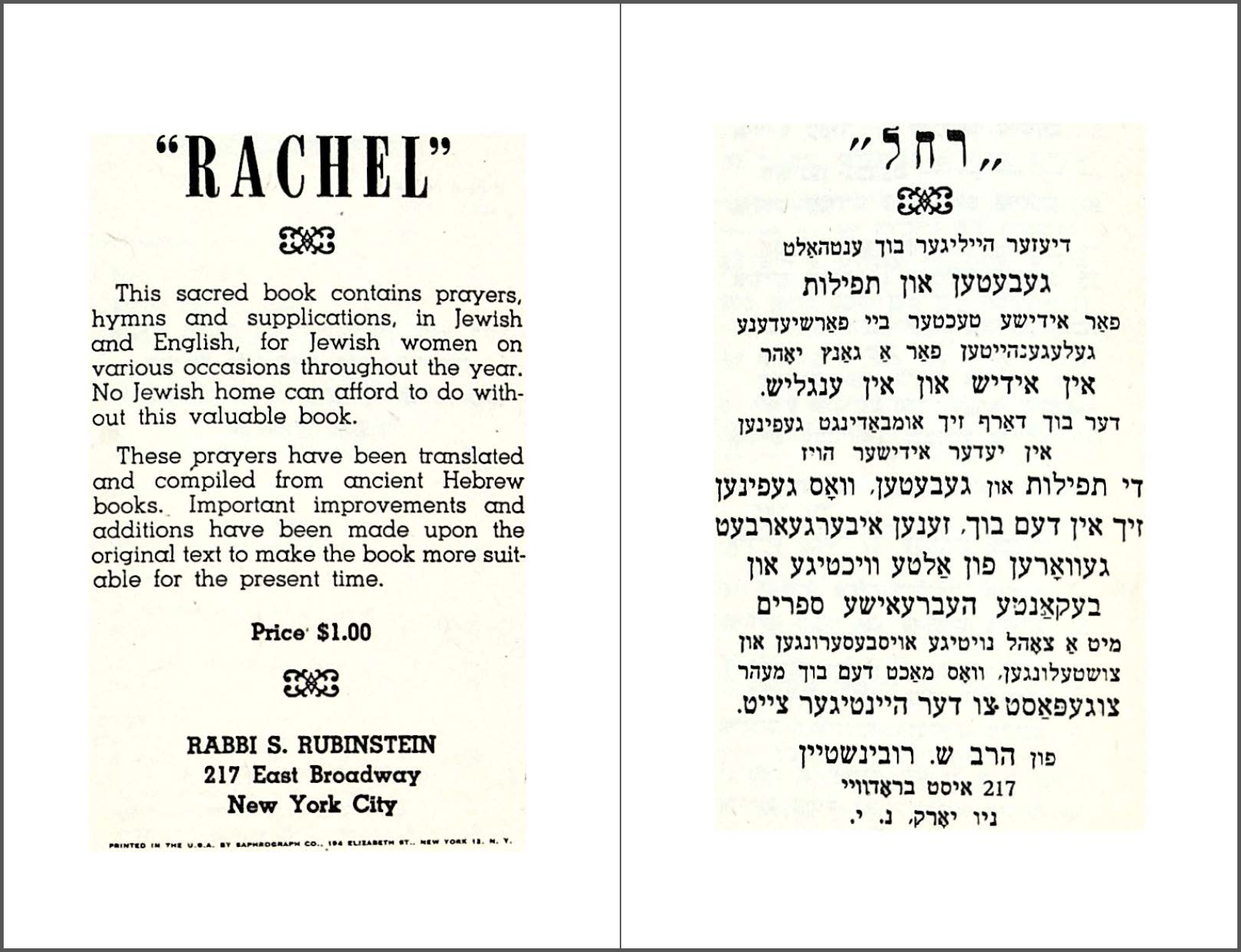This is רחל Rachel (1952), a bilingual Yiddish-English anthology of teḥinot compiled and translated by Rabbi Solomon Rubinstein containing twenty-one prayers. “Rachel” was one of the very last of the seder tkhines published in the 20th century before a revival of interest in Jewish women’s prayer literature was spurred in the 1990s.
Unfortunately, we have not yet been able to locate any further information on Rabbi Rubinstein which might help to contextualize this collection. The single clue left in the volume is an address: “217 East Broadway,” and from this we have been able to learn the rabbi’s first name from the 1950 US Census. (Many thanks to genealogist Hillary Einziger!) Other details in the census suggest a Hungarian-Jewish family whose resettlement following the devastation of the Holocaust and World War Ⅱ was aided by the 1948 Displaced Persons Act. If you know more about the life and career of Rabbi Solomon Rubinstein, please contact us.

This digital edition was prepared by Aharon Varady from an item held in the collection of the HUC-JIR Klau library, Cincinnati. (Thank you!) The page order has been modified from the original printing in order to integrate the English translations with the Yiddish sourcetext for each prayer. (Originally, the Yiddish and English were kept in opposite sections of the book with the Yiddish opening the book right-to-left, and the English opening left-to-right.)
This work is in the Public Domain due to it having never been registered with the United States Copyright Office, a condition required for the copyright of works prior to the signing of the Berne Convention Implementation Act of 1988 on March 1, 1989.
Source (Yiddish) Translation (English)
217 איסט בראַדװײ
ניױאָרקינט י
217 East Broadway
New York City
Source (Yiddish) Translation (English)
Source (Yiddish) Translation (English)
Source (Yiddish) Translation (English)
מאָרגען געבעט
תפילה פאר פּרנסה
תפילה ביים ליכט־צינדען שבת אָדער יום טוב און די דינים און מנהגים פון ליכט צינדען, װאָס יעדע אידישע פרוי דאַרף וויסען
תפילה פאַר אַ שװאַנגערע פרוי פאַר זיך
תפילה פאַר קינדער האָבען
תפילה וועגען אַ קראַנקען (ביים קראַנקענס בעט אָדער פון ווייטענס)
נאָך אַ תפילה װעגען אַ קראַנקען
תפילה אין שבת ווען מען בענשט ראש חודש
תפילה און מנהגים ביים מזכיר נשמות זיין (יזכור)
א ברכה ווען מען קומט אויפן בית עלמין נאָך דרײסיג טעג
תפילה װען מען קומט פון אַ ווייטען װעג אױף קבר אבות (צו יעדער צייט)
תפילה אויף אַ פאַטערס קבר (צו יעדער צייט)
תפילה אויף א מוטערס קבר (צו יעדער צייט)
תפילה אויף אַ פאָטערס יאָר צייט (אויף דעם בית עולם אָדער אויך אין דער היים)
תפילה אויף אַ מוטערס יאָר צייט (אויף דעם בית עולם אָדער אויך אין דער היים)
תפילה װעגען אַ קראַנקען (אויף דעם בית עולם)
תפילה פאַר אַ מאַן אויף דעם ווייב׳ס קבר (ווען נאָך ניט פערהייראַט)
תפילה פאַר אַ ווייב אויף דעם מאַן׳ס קבר (ווען נאָך ניט פערהייראַט)
תפילה צו זאָגען ביי דעם ברודערס קבר
תפילה צו זאָגען ביי דער שוועסטערס קבר
תפילה אויפן בית עולם פון חודש אלול, ערב ראש השנה און ערב יום כיפּור
Morning prayer
Prayer for sustenance
Prayer at lighting the Sabbath or holiday lights, with presentation of laws and customs attending it
A prayer for a woman who expects to become a mother
A prayer for children
A prayer for the sick (at the patient’s bedside or otherwise)
Another prayer for the sick
A prayer for a happy new month
A memorial prayer for the dead (Yizkor)
A prayer to be recited on entering the cemetery by one who has not visited it for thirty days
A prayer on visiting the cemetery coming from a distant way at any time of the year
A prayer on the father’s grave (at any time)
A prayer on the mother’s grave (at any time)
A prayer on father’s death anniversary (to be recited on the cemetery or otherwise)
A prayer on mother’s death anniversary (to be recited on the cemetery or otherwise)
A prayer for the sick (to be recited on the cemetery)
A prayer on the wife’s grave (when not remarried)
A prayer on the husband’s grave
A prayer on a sister’s grave
A prayer on a brother’s grave
A prayer on visiting the cemetery from the beginning of the month of Elul, on the day before New Year (Roshashono) and on the day before Yom Kippur
Notes
| 1 | a/k/a “הָסַּגַת גְּבוּל“ |
|---|---|
| 2 | lit. “moving boundary stones” — here referencing its more expansive relevance in the halakhic discourse over unfair competition. |


